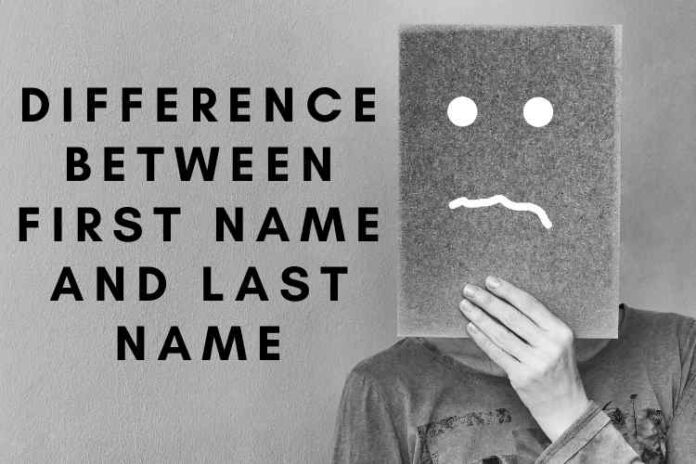What is the Difference Between First Name and Last Name
Individuals are given names by their parents as identification in society and according to cultural norms. Our name is our first identification. In most cases, a person’s name is divided into two half. The first name is the name given to you when you were born. The child’s surname (last name) is the name of the family to whom he or she was born. First and last names can have various meanings and importance depending on the nation, culture, and tradition. Because the family is the smallest unit of society, this strategy works effectively for both males and females. Friends and colleagues like to refer to you by your first name, however, in official units, people prefer to refer to you by your last name. If you are unaware of the difference between first name and last name, then read this blog post as here we are going to share the difference between the two.
RELATED – KNOWLEDGE VS UNDERSTANDING: KNOW THE EXACT DIFFERENCE
What is First Name?
The first name is the name given to a person at birth or during baptism in order for them to be easily recognized among their family members and society. It is also possible to incorporate a middle name in the first name. The given name is the first name in many cultures. However, some civilizations, particularly those in Asia, may place it in a different position. The given name comes first in western cultures, followed by the last name or surname, but in Chinese and Japanese cultures, the family name comes first, followed by the first name. To distinguish between persons with the same last name, the first name is crucial. They’re also crucial for a person’s sense of self-identity.
RELATED – KNOW THE MAJOR DIFFERENCE BETWEEN CO-CURRICULAR AND EXTRACURRICULAR ACTIVITIES
What is Last Name?
In the cultural system of many civilizations, the last name refers to the identity given to an individual to symbolize the family name. The surname refers to the last name, which is shared by all members of the family. The surname is always passed down through the generations. Surnames are derived from fathers’ surnames in most nations. Surnames are crucial for tracing one’s roots and ancestors. In formal contexts, last names are used to refer to seniors, associates, and coworkers. In Western civilizations, the last name comes after the first name, whereas in Chinese traditions, it comes before the first name. Surnames have different origins depending on where they are used. The majority of surnames are derived from a person’s occupation, such as Taylor, Shepherd, Fisher, and Baker. Surnames were also based on a variety of other qualities or attributes, such as locations, personal characteristics, and so on. In several places, such as India, a woman takes her husband’s surname once they marry and before marriage, she takes the last name from her father. Things are changing, and the notion of gaining the last name is evolving as well.
A person’s identity is made up of both their first and last names. As a result, the initial name and surname are intertwined. People were recognized by their first names solely throughout the early Middle Ages, but as communities became larger, the necessity for additional names arose. As first names grew more prevalent, the idea of a different name was quickly embraced.
Conclusion
So, by comparing these Difference Between First Name and Last Name, you can select the best option for you.


